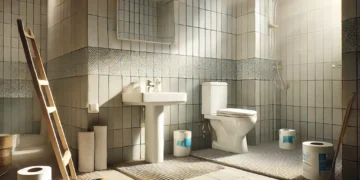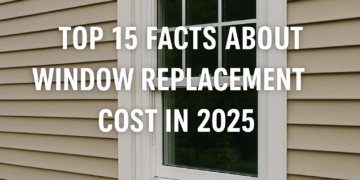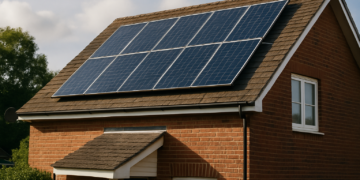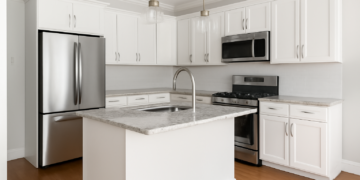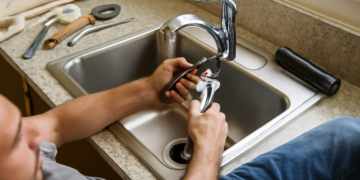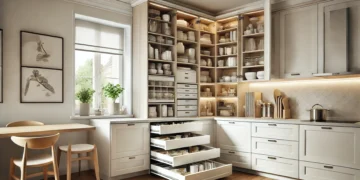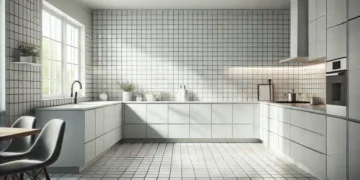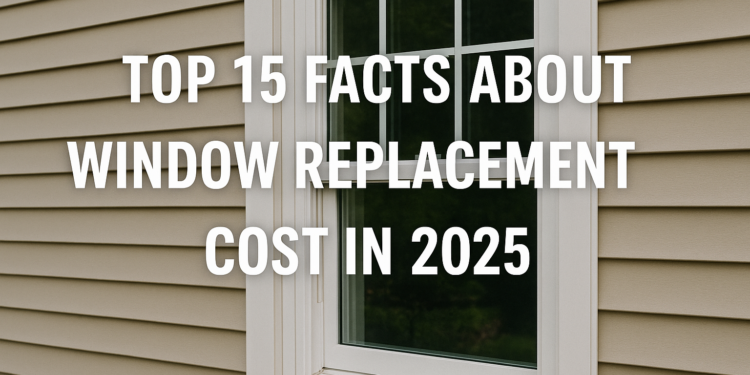Home window replacement is a significant financial undertaking. The window replacement cost is a crucial part of the home renovation budget. In this guide, we will check the mean cost of new windows, the pricing of different windows, and the recommendations from homeowners on how to manage costs.
Understanding the costs of major home projects is essential, much like detailing the price for a kitchen remodeling.
Understanding Window Replacement Cost
 One of the main problems for the homeowner is the windows and labor costs. Generally, the window replacement cost involves both the supply of materials and the work. New window prices start ranging from pocket-friendly offers to premium models, which are costly.
One of the main problems for the homeowner is the windows and labor costs. Generally, the window replacement cost involves both the supply of materials and the work. New window prices start ranging from pocket-friendly offers to premium models, which are costly.
Learning about window replacement cost, budgeting, and saving are key steps. For more strategies on decorating and improving your home while staying within a budget, explore our affordable home decor ideas.
Factors Affecting Window Cost

- Window size
- Window type
- Frame material
- Glass quality
- Energy efficiency
- Brand name
- Installation complexity
Average Cost of New Windows
 Most times, the average cost of new windows mentioned differs based on the above factors. One of the most frequently asked questions by homeowners can be, “How much do windows cost?” The cost typically ranges from $300 to $1,000 per window installed. For more detailed average costs, including breakdowns by type and region, you can refer to comprehensive guides from resources like Angi.
Most times, the average cost of new windows mentioned differs based on the above factors. One of the most frequently asked questions by homeowners can be, “How much do windows cost?” The cost typically ranges from $300 to $1,000 per window installed. For more detailed average costs, including breakdowns by type and region, you can refer to comprehensive guides from resources like Angi.
Cost Breakdown by Window Type

- Single-hung: $100 – $400
- Double-hung: $150 – $650
- Casement: $200 – $1,000
- Bay: $1,000 – $4,500
- Slider: $150 – $800
How Much to Replace Windows in an Entire Home?
 Many factors come into play in determining the total cost of replacing home windows and their types. On average, the cost of replacing 10 windows in a home with about 10 windows could range from $3,000 to $10,000 or more.
Many factors come into play in determining the total cost of replacing home windows and their types. On average, the cost of replacing 10 windows in a home with about 10 windows could range from $3,000 to $10,000 or more.
Factors Influencing Total Cost

- Number of windows
- Window sizes
- Structural modifications needed
- Local labor rates
- Permits and inspections
Window Frame Materials and Their Costs
 The choice of the material of the frames most importantly affects the price of the windows. Each kind has its worth and advantages. For a detailed look at the different window frame materials and how they compare in terms of durability and cost, the Window and Door Manufacturers Association (WDMA) provides valuable information.
The choice of the material of the frames most importantly affects the price of the windows. Each kind has its worth and advantages. For a detailed look at the different window frame materials and how they compare in terms of durability and cost, the Window and Door Manufacturers Association (WDMA) provides valuable information.
Vinyl Windows
 Vinyl, which is cheaper and simpler to maintain, is the favorite choice of consumers. The total price of a vinyl window ranges from $100 to $900 each. This material is also a popular and cost-effective choice for home exteriors, as detailed in our guide on vinyl siding cost.
Vinyl, which is cheaper and simpler to maintain, is the favorite choice of consumers. The total price of a vinyl window ranges from $100 to $900 each. This material is also a popular and cost-effective choice for home exteriors, as detailed in our guide on vinyl siding cost.
Wood Windows
 The classic beauty of wooden windows makes this option popular, but the windows need to be maintained properly from time to time. The prices for wood-framed windows may range from $150 to $1300 per window.
The classic beauty of wooden windows makes this option popular, but the windows need to be maintained properly from time to time. The prices for wood-framed windows may range from $150 to $1300 per window.
Fiberglass Windows
 Fiberglass comprises the attributes that make it long-lasting as well as energy-saving. Normally, the window replacement cost for fiberglass frames may range from $500 to $1,500 per window.
Fiberglass comprises the attributes that make it long-lasting as well as energy-saving. Normally, the window replacement cost for fiberglass frames may range from $500 to $1,500 per window.
Aluminum Windows
 Aluminum is an easy-handling material and quite an affordable choice for homeowners. The cost of a new aluminum window ranges from $75 to $400 each. Aluminum is another material commonly used for home exteriors, and you can learn about its costs in our article on aluminum siding cost.
Aluminum is an easy-handling material and quite an affordable choice for homeowners. The cost of a new aluminum window ranges from $75 to $400 each. Aluminum is another material commonly used for home exteriors, and you can learn about its costs in our article on aluminum siding cost.
Energy-Efficient Windows and Their Impact on Cost
 Even though the first-price productivity of energy-efficient windows is expensive, they account for significant energy savings in the long run. The price of an energy-efficient option is typically 10–20% higher than that of a standard window.
Even though the first-price productivity of energy-efficient windows is expensive, they account for significant energy savings in the long run. The price of an energy-efficient option is typically 10–20% higher than that of a standard window.
Energy-Efficient Features

- Double-pane or triple-pane glass
- Low-E coatings
- Gas fills (argon, krypton)
- Warm-edge spacers
For technical details and certification information on these energy-efficient features, the National Fenestration Rating Council (NFRC) is the certifying body.
DIY vs. Professional Installation
 Choosing to install windows yourself can reduce the installation price. Nevertheless, studious installation is required for proper fitting and may void the warranty.
Choosing to install windows yourself can reduce the installation price. Nevertheless, studious installation is required for proper fitting and may void the warranty.
DIY Installation Considerations

- Craft required skill level.
- Time commitment
- Necessary tools
- Challenges of potential mistakes
- Warranty explanations
Considering DIY installation considerations is crucial for any home project that requires skills, much like undertaking a DIY bathroom remodel.
Financing Options for Window Replacement
 Replacing your windows and covering the installation fees could be a costly endeavor for sure. There are numerous plans that can help you make the payment.
Replacing your windows and covering the installation fees could be a costly endeavor for sure. There are numerous plans that can help you make the payment.
Common Financing Options

- Getting your home equity
- Applying for a personal loan
- Using a credit card
- Manufacturer’s financing
- Government sponsorship
Saving Money on Window Replacement Cost
 You are smart to look for new ways to save money on your window replacement project without compromising quality.
You are smart to look for new ways to save money on your window replacement project without compromising quality.
Cost-Saving Tips

- Get estimates from multiple contractors.
- Take advantage of the off-peak season installation
- Avail yourself of the energy efficiency rebate programs
- Choose those that are of standard size, where possible
- Choose the option of replacing a part of the window if some of the windows are still in excellent condition.
Window Replacement Cost: Regional Variations
 New windows can be priced differently according to the location. Labor fees and building regulations can add to your overall budget as well.
New windows can be priced differently according to the location. Labor fees and building regulations can add to your overall budget as well.
Factors Influencing Regional Costs

- Climatic and environmental issues
- Regulation of the building codes
- Local labor market rate
- Supply of materials
Long-Term Benefits of Window Replacement
 Although the first bill for the window replacement project may be a little too much, one should consider the long-term benefits of it.
Although the first bill for the window replacement project may be a little too much, one should consider the long-term benefits of it.
Benefits of New Windows

- Better energy efficiency
- A home becomes more valuable
- Comfortable and quieter homes
- No need for maintenance
- Updated designs of windows
Achieving comfortable and quieter homes contributes significantly to creating a cozy aesthetic.
Choosing the Right Windows for Your Home
 Selecting the right windows should be a task that one conducts by considering more than asking how much the windows and installation will cost him/her.
Selecting the right windows should be a task that one conducts by considering more than asking how much the windows and installation will cost him/her.
Factors to Consider

- House architecture
- Climate and weather terms
- Energy efficiency demands
- The degree of maintenance you are willing to do
- Restrictions on the budget
The Window Replacement Process
 Homeowners can make informed decisions about window replacement projects and costs by learning the process.
Homeowners can make informed decisions about window replacement projects and costs by learning the process.
Steps in Window Replacement

- Initial consultation and measurements
- Your preference for window styles and materials
- Getting quotes and hiring a contractor
- Appointment confirmed.
- The work area is set up
- Old windows are detached
- New windows are installed
- Clean-up and final inspection of the property
Understanding Window Ratings and Labels
1. ENERGY STAR Certification

ENERGY STAR-qualified windows comply with the set standards for energy efficiency by the U.S. Environmental Protection Agency and the U.S. Department of Energy. Understanding certifications like this is important when creating energy-saving homes.
2. U-Factor
 U-Factor is the measurement of how good or bad a window is at insulating. The lower the U-Factor gets, the more the insulation properties.
U-Factor is the measurement of how good or bad a window is at insulating. The lower the U-Factor gets, the more the insulation properties.
3. Solar Heat Gain Coefficient (SHGC)
 SHGC is a measure of how much solar radiation can pass through a window. Getting lower SHGC values means lower heat gain.
SHGC is a measure of how much solar radiation can pass through a window. Getting lower SHGC values means lower heat gain.
4. Visible Transmittance (VT)

VT shows the amount of light that can pass through a window. More satisfactory VT values naturally mean a lighter home.
5. Air Leakage (AL)

AL shows the amount of air that can enter a room through the window. Lower AL values indicate better air tightness. Understanding these factors is key when trying to winterize your home effectively.
Preparing Your Home for Window Replacement
1. Clear the Work Area
 To get them as close to the job site as possible and avoid the hassle of entering and exiting the house, clear the area around the window by removing furniture, curtains, and other items.
To get them as close to the job site as possible and avoid the hassle of entering and exiting the house, clear the area around the window by removing furniture, curtains, and other items.
2. Protect Flooring
 Putting a drop cloth or plastic sheet on your floor near the window should keep the floor clean and prevent damage from any debris or tools used during the installation process.
Putting a drop cloth or plastic sheet on your floor near the window should keep the floor clean and prevent damage from any debris or tools used during the installation process.
3. Plan for Noise and Dust
 Consider installation, as you could have a problem with a higher noise level and little dust during the process.
Consider installation, as you could have a problem with a higher noise level and little dust during the process.
4. Arrange for Pet Care
 Plan accordingly for pet care before the installation so that your pets will be safer with less stress. If you have guests, keep your pets in a quiet, safe place.
Plan accordingly for pet care before the installation so that your pets will be safer with less stress. If you have guests, keep your pets in a quiet, safe place.
5. Discuss Timeline with Installers
 You need to talk to your installation team about the planned timeline and any special requirements or concerns you might have.
You need to talk to your installation team about the planned timeline and any special requirements or concerns you might have.
Conclusion
 When it comes to home improvement projects, the cost of replacing the window is the largest component of the whole project. New window prices can vary significantly based on the criteria listed, such as the necessary material, style, and efficiency. Homeowners should carefully evaluate their needs, available financing, and long-term perspectives when planning a window replacement project. They are likely to attain a quality yet affordable outcome. You are welcome to recall that, besides the large initial investment, new windows offer the benefit of energy, providing comfort, and improving the house’s value in the long run.
When it comes to home improvement projects, the cost of replacing the window is the largest component of the whole project. New window prices can vary significantly based on the criteria listed, such as the necessary material, style, and efficiency. Homeowners should carefully evaluate their needs, available financing, and long-term perspectives when planning a window replacement project. They are likely to attain a quality yet affordable outcome. You are welcome to recall that, besides the large initial investment, new windows offer the benefit of energy, providing comfort, and improving the house’s value in the long run.
Frequently Asked Questions (FAQs)
How much does it cost to replace windows?
It depends on the window. Most of the usual cement of windows plunks down from $300 to $1,000 per unit, which covers the entire process of installation.
What factors affect the price of new windows?
One has to factor in the particular window size, window type, window material, window energy efficiency, window brand, and the labor cost involved in the installation, if any.
How much do windows cost on average?
Average window prices vary from $100 to $1,500, depending on various factors; however, these figures are subject to change.
Is DIY window installation cheaper than professional installation?
DIY can be cheaper, but it requires skills and may void warranties. Professional installation ensures proper fitting.
How can I save money on window replacement costs?
Get as many quotes as possible and check them all out in no time. When you see something with more than the average number of windows, choose the same size. Go to the jurisdiction for more information on rebates and programs.
Are you ready to get new windows? Plan ahead, save money, and pick the best options for your home with our complete guide on how much it costs to replace windows. Don’t wait—start making your windows better right now!


